Philosophy Assignment: Nietzsche, Nagel, Camus, and Schlick Analysis
VerifiedAdded on 2023/01/18
|9
|2994
|1
Homework Assignment
AI Summary
This philosophy assignment analyzes the ideas of Friedrich Nietzsche, Thomas Nagel, Albert Camus, and Moritz Schlick, addressing questions on their similarities and differences. The assignment explores Nietzsche's views on Nagel, Camus, and Schlick, examining their perspectives on the meaning of life, the problem of the absurd, and the role of play. It highlights the contrasts between Nietzsche's emphasis on art and illusion with Camus's acceptance of the absurd. Furthermore, the assignment delves into Schlick's views on the meaning of life, contrasting them with Nietzsche's. Finally, the assignment considers a passion not explored by Nietzsche and discusses its potential spiritualized nature, concluding with a personal reflection on the meaning of life in relation to the studied philosophers.
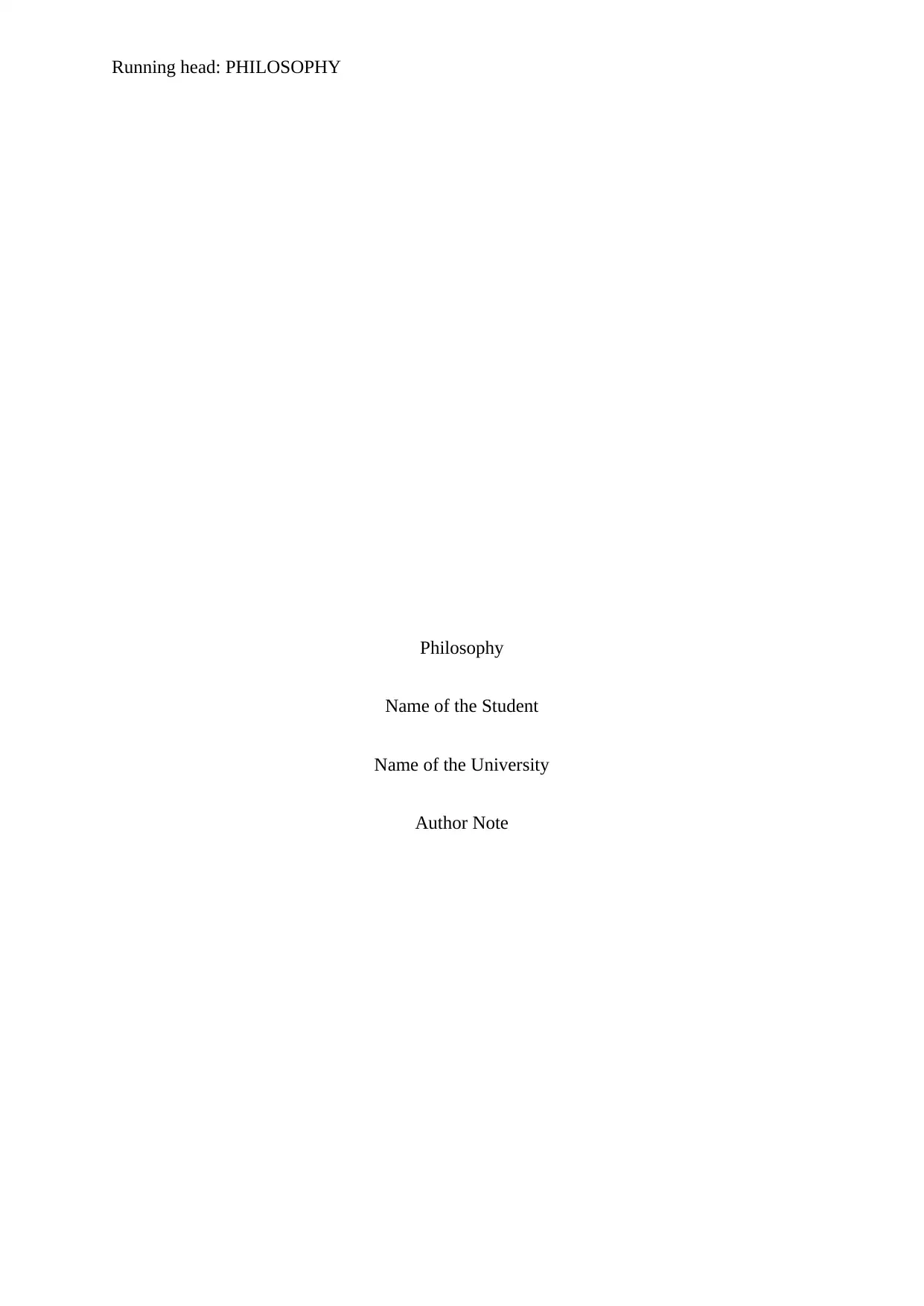
Running head: PHILOSOPHY
Philosophy
Name of the Student
Name of the University
Author Note
Philosophy
Name of the Student
Name of the University
Author Note
Paraphrase This Document
Need a fresh take? Get an instant paraphrase of this document with our AI Paraphraser
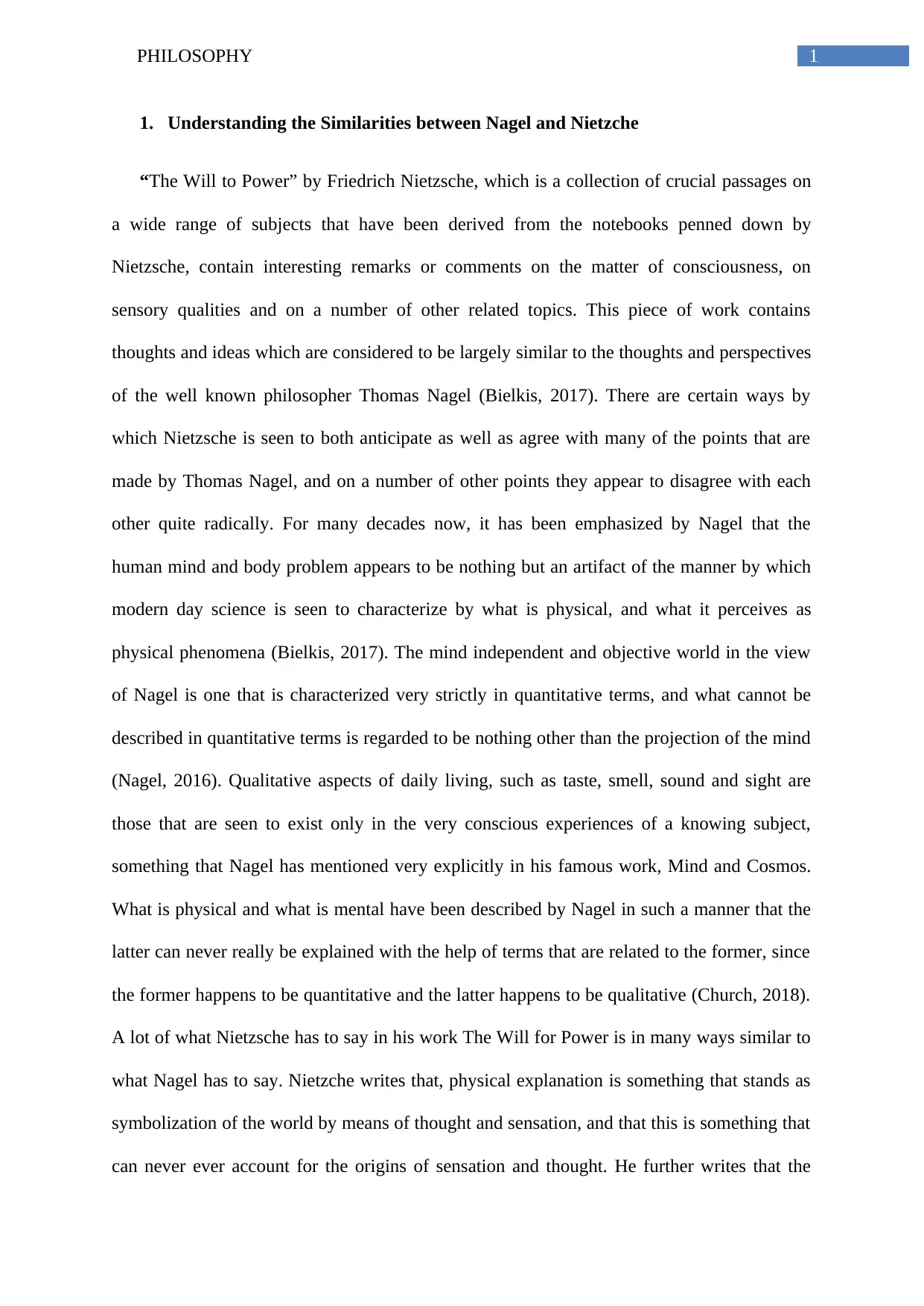
1PHILOSOPHY
1. Understanding the Similarities between Nagel and Nietzche
“The Will to Power” by Friedrich Nietzsche, which is a collection of crucial passages on
a wide range of subjects that have been derived from the notebooks penned down by
Nietzsche, contain interesting remarks or comments on the matter of consciousness, on
sensory qualities and on a number of other related topics. This piece of work contains
thoughts and ideas which are considered to be largely similar to the thoughts and perspectives
of the well known philosopher Thomas Nagel (Bielkis, 2017). There are certain ways by
which Nietzsche is seen to both anticipate as well as agree with many of the points that are
made by Thomas Nagel, and on a number of other points they appear to disagree with each
other quite radically. For many decades now, it has been emphasized by Nagel that the
human mind and body problem appears to be nothing but an artifact of the manner by which
modern day science is seen to characterize by what is physical, and what it perceives as
physical phenomena (Bielkis, 2017). The mind independent and objective world in the view
of Nagel is one that is characterized very strictly in quantitative terms, and what cannot be
described in quantitative terms is regarded to be nothing other than the projection of the mind
(Nagel, 2016). Qualitative aspects of daily living, such as taste, smell, sound and sight are
those that are seen to exist only in the very conscious experiences of a knowing subject,
something that Nagel has mentioned very explicitly in his famous work, Mind and Cosmos.
What is physical and what is mental have been described by Nagel in such a manner that the
latter can never really be explained with the help of terms that are related to the former, since
the former happens to be quantitative and the latter happens to be qualitative (Church, 2018).
A lot of what Nietzsche has to say in his work The Will for Power is in many ways similar to
what Nagel has to say. Nietzche writes that, physical explanation is something that stands as
symbolization of the world by means of thought and sensation, and that this is something that
can never ever account for the origins of sensation and thought. He further writes that the
1. Understanding the Similarities between Nagel and Nietzche
“The Will to Power” by Friedrich Nietzsche, which is a collection of crucial passages on
a wide range of subjects that have been derived from the notebooks penned down by
Nietzsche, contain interesting remarks or comments on the matter of consciousness, on
sensory qualities and on a number of other related topics. This piece of work contains
thoughts and ideas which are considered to be largely similar to the thoughts and perspectives
of the well known philosopher Thomas Nagel (Bielkis, 2017). There are certain ways by
which Nietzsche is seen to both anticipate as well as agree with many of the points that are
made by Thomas Nagel, and on a number of other points they appear to disagree with each
other quite radically. For many decades now, it has been emphasized by Nagel that the
human mind and body problem appears to be nothing but an artifact of the manner by which
modern day science is seen to characterize by what is physical, and what it perceives as
physical phenomena (Bielkis, 2017). The mind independent and objective world in the view
of Nagel is one that is characterized very strictly in quantitative terms, and what cannot be
described in quantitative terms is regarded to be nothing other than the projection of the mind
(Nagel, 2016). Qualitative aspects of daily living, such as taste, smell, sound and sight are
those that are seen to exist only in the very conscious experiences of a knowing subject,
something that Nagel has mentioned very explicitly in his famous work, Mind and Cosmos.
What is physical and what is mental have been described by Nagel in such a manner that the
latter can never really be explained with the help of terms that are related to the former, since
the former happens to be quantitative and the latter happens to be qualitative (Church, 2018).
A lot of what Nietzsche has to say in his work The Will for Power is in many ways similar to
what Nagel has to say. Nietzche writes that, physical explanation is something that stands as
symbolization of the world by means of thought and sensation, and that this is something that
can never ever account for the origins of sensation and thought. He further writes that the
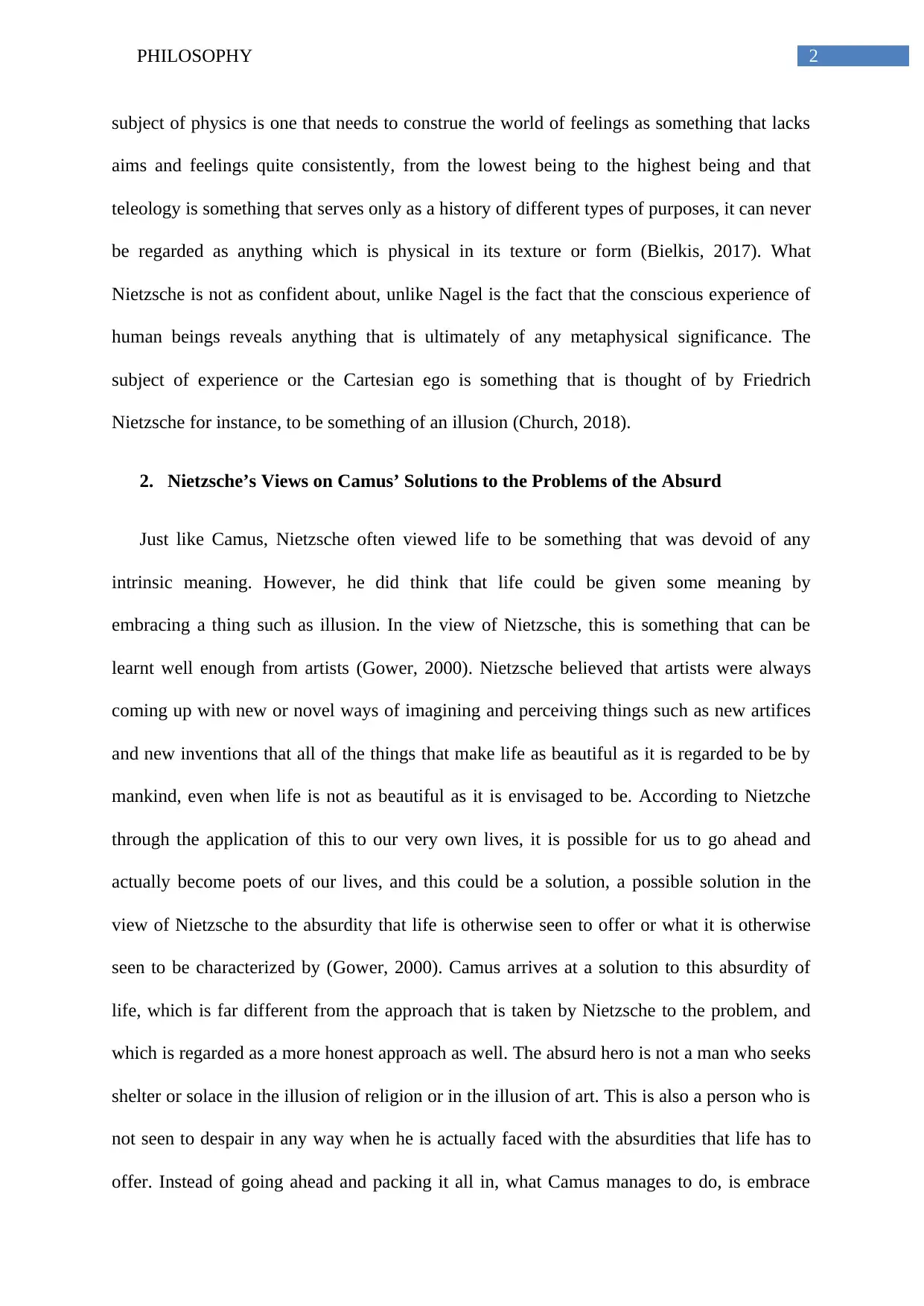
2PHILOSOPHY
subject of physics is one that needs to construe the world of feelings as something that lacks
aims and feelings quite consistently, from the lowest being to the highest being and that
teleology is something that serves only as a history of different types of purposes, it can never
be regarded as anything which is physical in its texture or form (Bielkis, 2017). What
Nietzsche is not as confident about, unlike Nagel is the fact that the conscious experience of
human beings reveals anything that is ultimately of any metaphysical significance. The
subject of experience or the Cartesian ego is something that is thought of by Friedrich
Nietzsche for instance, to be something of an illusion (Church, 2018).
2. Nietzsche’s Views on Camus’ Solutions to the Problems of the Absurd
Just like Camus, Nietzsche often viewed life to be something that was devoid of any
intrinsic meaning. However, he did think that life could be given some meaning by
embracing a thing such as illusion. In the view of Nietzsche, this is something that can be
learnt well enough from artists (Gower, 2000). Nietzsche believed that artists were always
coming up with new or novel ways of imagining and perceiving things such as new artifices
and new inventions that all of the things that make life as beautiful as it is regarded to be by
mankind, even when life is not as beautiful as it is envisaged to be. According to Nietzche
through the application of this to our very own lives, it is possible for us to go ahead and
actually become poets of our lives, and this could be a solution, a possible solution in the
view of Nietzsche to the absurdity that life is otherwise seen to offer or what it is otherwise
seen to be characterized by (Gower, 2000). Camus arrives at a solution to this absurdity of
life, which is far different from the approach that is taken by Nietzsche to the problem, and
which is regarded as a more honest approach as well. The absurd hero is not a man who seeks
shelter or solace in the illusion of religion or in the illusion of art. This is also a person who is
not seen to despair in any way when he is actually faced with the absurdities that life has to
offer. Instead of going ahead and packing it all in, what Camus manages to do, is embrace
subject of physics is one that needs to construe the world of feelings as something that lacks
aims and feelings quite consistently, from the lowest being to the highest being and that
teleology is something that serves only as a history of different types of purposes, it can never
be regarded as anything which is physical in its texture or form (Bielkis, 2017). What
Nietzsche is not as confident about, unlike Nagel is the fact that the conscious experience of
human beings reveals anything that is ultimately of any metaphysical significance. The
subject of experience or the Cartesian ego is something that is thought of by Friedrich
Nietzsche for instance, to be something of an illusion (Church, 2018).
2. Nietzsche’s Views on Camus’ Solutions to the Problems of the Absurd
Just like Camus, Nietzsche often viewed life to be something that was devoid of any
intrinsic meaning. However, he did think that life could be given some meaning by
embracing a thing such as illusion. In the view of Nietzsche, this is something that can be
learnt well enough from artists (Gower, 2000). Nietzsche believed that artists were always
coming up with new or novel ways of imagining and perceiving things such as new artifices
and new inventions that all of the things that make life as beautiful as it is regarded to be by
mankind, even when life is not as beautiful as it is envisaged to be. According to Nietzche
through the application of this to our very own lives, it is possible for us to go ahead and
actually become poets of our lives, and this could be a solution, a possible solution in the
view of Nietzsche to the absurdity that life is otherwise seen to offer or what it is otherwise
seen to be characterized by (Gower, 2000). Camus arrives at a solution to this absurdity of
life, which is far different from the approach that is taken by Nietzsche to the problem, and
which is regarded as a more honest approach as well. The absurd hero is not a man who seeks
shelter or solace in the illusion of religion or in the illusion of art. This is also a person who is
not seen to despair in any way when he is actually faced with the absurdities that life has to
offer. Instead of going ahead and packing it all in, what Camus manages to do, is embrace
⊘ This is a preview!⊘
Do you want full access?
Subscribe today to unlock all pages.

Trusted by 1+ million students worldwide
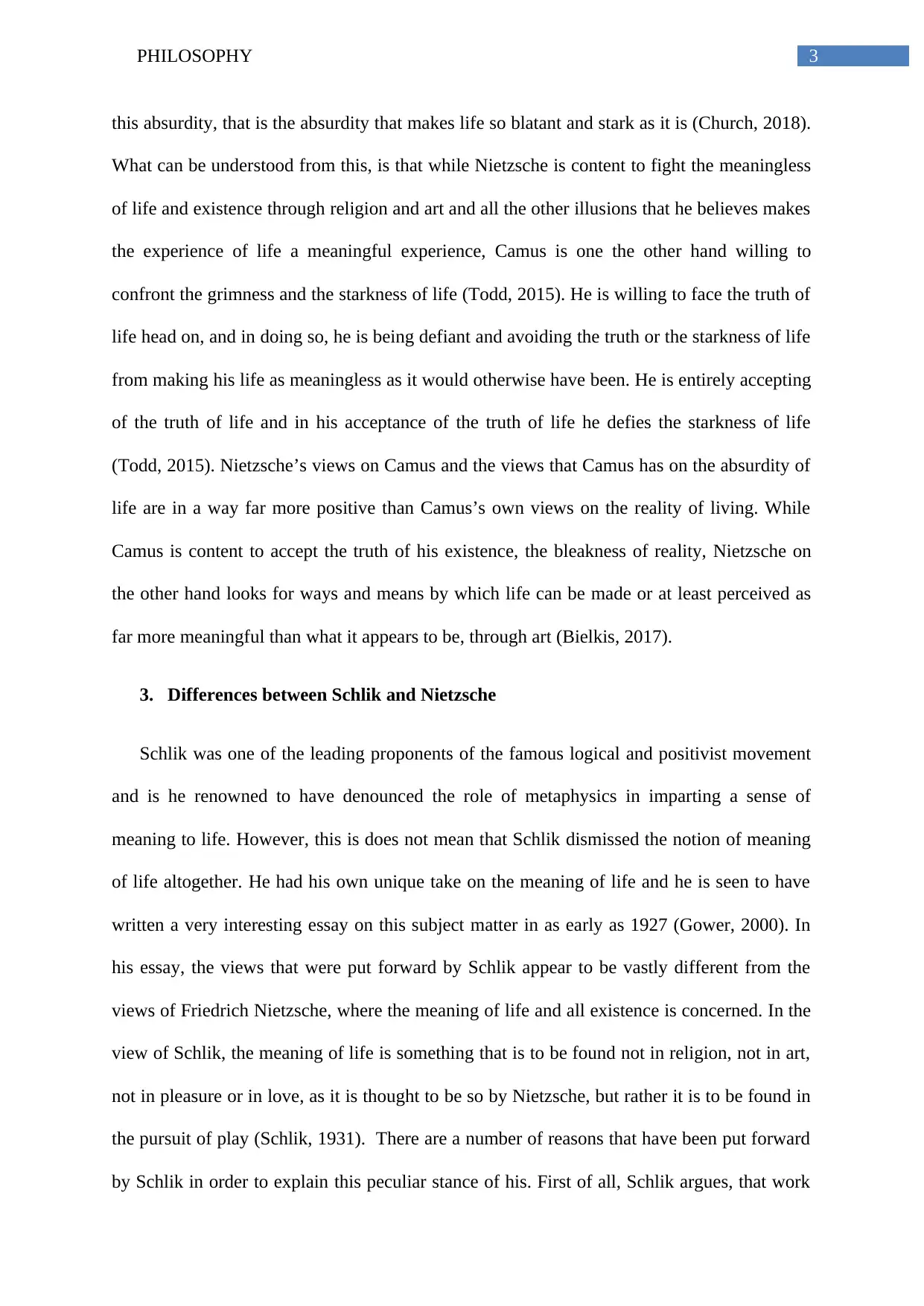
3PHILOSOPHY
this absurdity, that is the absurdity that makes life so blatant and stark as it is (Church, 2018).
What can be understood from this, is that while Nietzsche is content to fight the meaningless
of life and existence through religion and art and all the other illusions that he believes makes
the experience of life a meaningful experience, Camus is one the other hand willing to
confront the grimness and the starkness of life (Todd, 2015). He is willing to face the truth of
life head on, and in doing so, he is being defiant and avoiding the truth or the starkness of life
from making his life as meaningless as it would otherwise have been. He is entirely accepting
of the truth of life and in his acceptance of the truth of life he defies the starkness of life
(Todd, 2015). Nietzsche’s views on Camus and the views that Camus has on the absurdity of
life are in a way far more positive than Camus’s own views on the reality of living. While
Camus is content to accept the truth of his existence, the bleakness of reality, Nietzsche on
the other hand looks for ways and means by which life can be made or at least perceived as
far more meaningful than what it appears to be, through art (Bielkis, 2017).
3. Differences between Schlik and Nietzsche
Schlik was one of the leading proponents of the famous logical and positivist movement
and is he renowned to have denounced the role of metaphysics in imparting a sense of
meaning to life. However, this is does not mean that Schlik dismissed the notion of meaning
of life altogether. He had his own unique take on the meaning of life and he is seen to have
written a very interesting essay on this subject matter in as early as 1927 (Gower, 2000). In
his essay, the views that were put forward by Schlik appear to be vastly different from the
views of Friedrich Nietzsche, where the meaning of life and all existence is concerned. In the
view of Schlik, the meaning of life is something that is to be found not in religion, not in art,
not in pleasure or in love, as it is thought to be so by Nietzsche, but rather it is to be found in
the pursuit of play (Schlik, 1931). There are a number of reasons that have been put forward
by Schlik in order to explain this peculiar stance of his. First of all, Schlik argues, that work
this absurdity, that is the absurdity that makes life so blatant and stark as it is (Church, 2018).
What can be understood from this, is that while Nietzsche is content to fight the meaningless
of life and existence through religion and art and all the other illusions that he believes makes
the experience of life a meaningful experience, Camus is one the other hand willing to
confront the grimness and the starkness of life (Todd, 2015). He is willing to face the truth of
life head on, and in doing so, he is being defiant and avoiding the truth or the starkness of life
from making his life as meaningless as it would otherwise have been. He is entirely accepting
of the truth of life and in his acceptance of the truth of life he defies the starkness of life
(Todd, 2015). Nietzsche’s views on Camus and the views that Camus has on the absurdity of
life are in a way far more positive than Camus’s own views on the reality of living. While
Camus is content to accept the truth of his existence, the bleakness of reality, Nietzsche on
the other hand looks for ways and means by which life can be made or at least perceived as
far more meaningful than what it appears to be, through art (Bielkis, 2017).
3. Differences between Schlik and Nietzsche
Schlik was one of the leading proponents of the famous logical and positivist movement
and is he renowned to have denounced the role of metaphysics in imparting a sense of
meaning to life. However, this is does not mean that Schlik dismissed the notion of meaning
of life altogether. He had his own unique take on the meaning of life and he is seen to have
written a very interesting essay on this subject matter in as early as 1927 (Gower, 2000). In
his essay, the views that were put forward by Schlik appear to be vastly different from the
views of Friedrich Nietzsche, where the meaning of life and all existence is concerned. In the
view of Schlik, the meaning of life is something that is to be found not in religion, not in art,
not in pleasure or in love, as it is thought to be so by Nietzsche, but rather it is to be found in
the pursuit of play (Schlik, 1931). There are a number of reasons that have been put forward
by Schlik in order to explain this peculiar stance of his. First of all, Schlik argues, that work
Paraphrase This Document
Need a fresh take? Get an instant paraphrase of this document with our AI Paraphraser
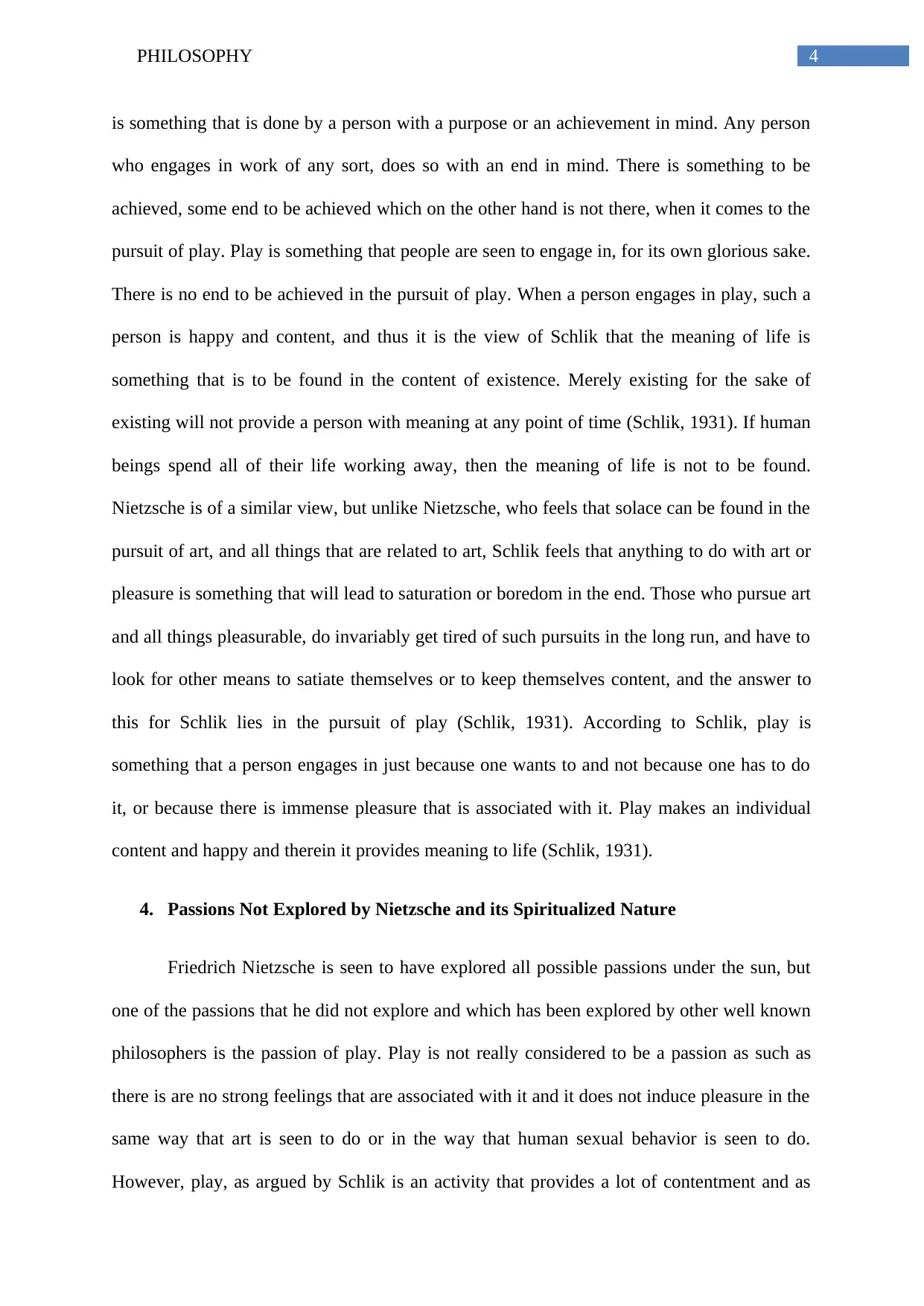
4PHILOSOPHY
is something that is done by a person with a purpose or an achievement in mind. Any person
who engages in work of any sort, does so with an end in mind. There is something to be
achieved, some end to be achieved which on the other hand is not there, when it comes to the
pursuit of play. Play is something that people are seen to engage in, for its own glorious sake.
There is no end to be achieved in the pursuit of play. When a person engages in play, such a
person is happy and content, and thus it is the view of Schlik that the meaning of life is
something that is to be found in the content of existence. Merely existing for the sake of
existing will not provide a person with meaning at any point of time (Schlik, 1931). If human
beings spend all of their life working away, then the meaning of life is not to be found.
Nietzsche is of a similar view, but unlike Nietzsche, who feels that solace can be found in the
pursuit of art, and all things that are related to art, Schlik feels that anything to do with art or
pleasure is something that will lead to saturation or boredom in the end. Those who pursue art
and all things pleasurable, do invariably get tired of such pursuits in the long run, and have to
look for other means to satiate themselves or to keep themselves content, and the answer to
this for Schlik lies in the pursuit of play (Schlik, 1931). According to Schlik, play is
something that a person engages in just because one wants to and not because one has to do
it, or because there is immense pleasure that is associated with it. Play makes an individual
content and happy and therein it provides meaning to life (Schlik, 1931).
4. Passions Not Explored by Nietzsche and its Spiritualized Nature
Friedrich Nietzsche is seen to have explored all possible passions under the sun, but
one of the passions that he did not explore and which has been explored by other well known
philosophers is the passion of play. Play is not really considered to be a passion as such as
there is are no strong feelings that are associated with it and it does not induce pleasure in the
same way that art is seen to do or in the way that human sexual behavior is seen to do.
However, play, as argued by Schlik is an activity that provides a lot of contentment and as
is something that is done by a person with a purpose or an achievement in mind. Any person
who engages in work of any sort, does so with an end in mind. There is something to be
achieved, some end to be achieved which on the other hand is not there, when it comes to the
pursuit of play. Play is something that people are seen to engage in, for its own glorious sake.
There is no end to be achieved in the pursuit of play. When a person engages in play, such a
person is happy and content, and thus it is the view of Schlik that the meaning of life is
something that is to be found in the content of existence. Merely existing for the sake of
existing will not provide a person with meaning at any point of time (Schlik, 1931). If human
beings spend all of their life working away, then the meaning of life is not to be found.
Nietzsche is of a similar view, but unlike Nietzsche, who feels that solace can be found in the
pursuit of art, and all things that are related to art, Schlik feels that anything to do with art or
pleasure is something that will lead to saturation or boredom in the end. Those who pursue art
and all things pleasurable, do invariably get tired of such pursuits in the long run, and have to
look for other means to satiate themselves or to keep themselves content, and the answer to
this for Schlik lies in the pursuit of play (Schlik, 1931). According to Schlik, play is
something that a person engages in just because one wants to and not because one has to do
it, or because there is immense pleasure that is associated with it. Play makes an individual
content and happy and therein it provides meaning to life (Schlik, 1931).
4. Passions Not Explored by Nietzsche and its Spiritualized Nature
Friedrich Nietzsche is seen to have explored all possible passions under the sun, but
one of the passions that he did not explore and which has been explored by other well known
philosophers is the passion of play. Play is not really considered to be a passion as such as
there is are no strong feelings that are associated with it and it does not induce pleasure in the
same way that art is seen to do or in the way that human sexual behavior is seen to do.
However, play, as argued by Schlik is an activity that provides a lot of contentment and as
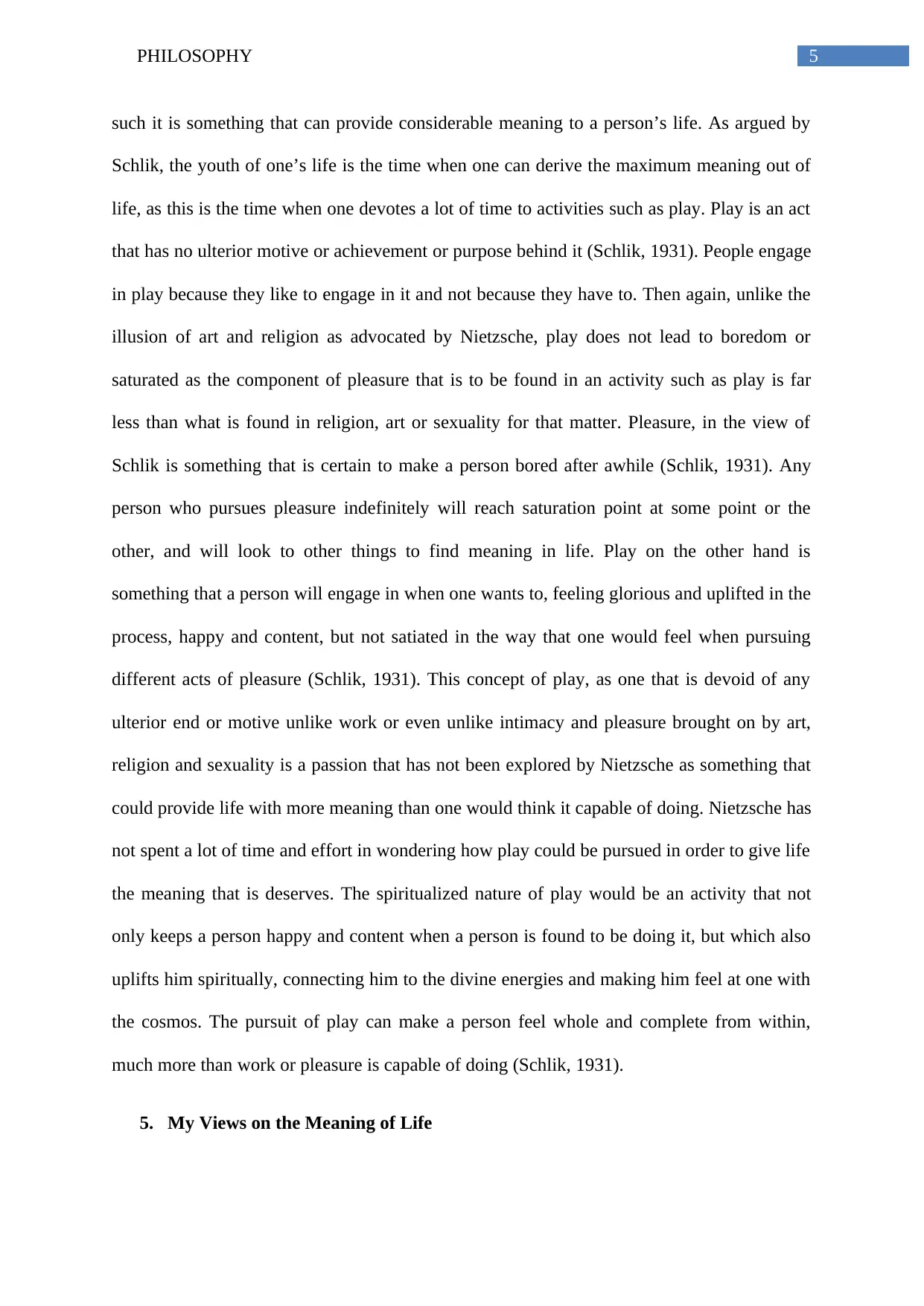
5PHILOSOPHY
such it is something that can provide considerable meaning to a person’s life. As argued by
Schlik, the youth of one’s life is the time when one can derive the maximum meaning out of
life, as this is the time when one devotes a lot of time to activities such as play. Play is an act
that has no ulterior motive or achievement or purpose behind it (Schlik, 1931). People engage
in play because they like to engage in it and not because they have to. Then again, unlike the
illusion of art and religion as advocated by Nietzsche, play does not lead to boredom or
saturated as the component of pleasure that is to be found in an activity such as play is far
less than what is found in religion, art or sexuality for that matter. Pleasure, in the view of
Schlik is something that is certain to make a person bored after awhile (Schlik, 1931). Any
person who pursues pleasure indefinitely will reach saturation point at some point or the
other, and will look to other things to find meaning in life. Play on the other hand is
something that a person will engage in when one wants to, feeling glorious and uplifted in the
process, happy and content, but not satiated in the way that one would feel when pursuing
different acts of pleasure (Schlik, 1931). This concept of play, as one that is devoid of any
ulterior end or motive unlike work or even unlike intimacy and pleasure brought on by art,
religion and sexuality is a passion that has not been explored by Nietzsche as something that
could provide life with more meaning than one would think it capable of doing. Nietzsche has
not spent a lot of time and effort in wondering how play could be pursued in order to give life
the meaning that is deserves. The spiritualized nature of play would be an activity that not
only keeps a person happy and content when a person is found to be doing it, but which also
uplifts him spiritually, connecting him to the divine energies and making him feel at one with
the cosmos. The pursuit of play can make a person feel whole and complete from within,
much more than work or pleasure is capable of doing (Schlik, 1931).
5. My Views on the Meaning of Life
such it is something that can provide considerable meaning to a person’s life. As argued by
Schlik, the youth of one’s life is the time when one can derive the maximum meaning out of
life, as this is the time when one devotes a lot of time to activities such as play. Play is an act
that has no ulterior motive or achievement or purpose behind it (Schlik, 1931). People engage
in play because they like to engage in it and not because they have to. Then again, unlike the
illusion of art and religion as advocated by Nietzsche, play does not lead to boredom or
saturated as the component of pleasure that is to be found in an activity such as play is far
less than what is found in religion, art or sexuality for that matter. Pleasure, in the view of
Schlik is something that is certain to make a person bored after awhile (Schlik, 1931). Any
person who pursues pleasure indefinitely will reach saturation point at some point or the
other, and will look to other things to find meaning in life. Play on the other hand is
something that a person will engage in when one wants to, feeling glorious and uplifted in the
process, happy and content, but not satiated in the way that one would feel when pursuing
different acts of pleasure (Schlik, 1931). This concept of play, as one that is devoid of any
ulterior end or motive unlike work or even unlike intimacy and pleasure brought on by art,
religion and sexuality is a passion that has not been explored by Nietzsche as something that
could provide life with more meaning than one would think it capable of doing. Nietzsche has
not spent a lot of time and effort in wondering how play could be pursued in order to give life
the meaning that is deserves. The spiritualized nature of play would be an activity that not
only keeps a person happy and content when a person is found to be doing it, but which also
uplifts him spiritually, connecting him to the divine energies and making him feel at one with
the cosmos. The pursuit of play can make a person feel whole and complete from within,
much more than work or pleasure is capable of doing (Schlik, 1931).
5. My Views on the Meaning of Life
⊘ This is a preview!⊘
Do you want full access?
Subscribe today to unlock all pages.

Trusted by 1+ million students worldwide
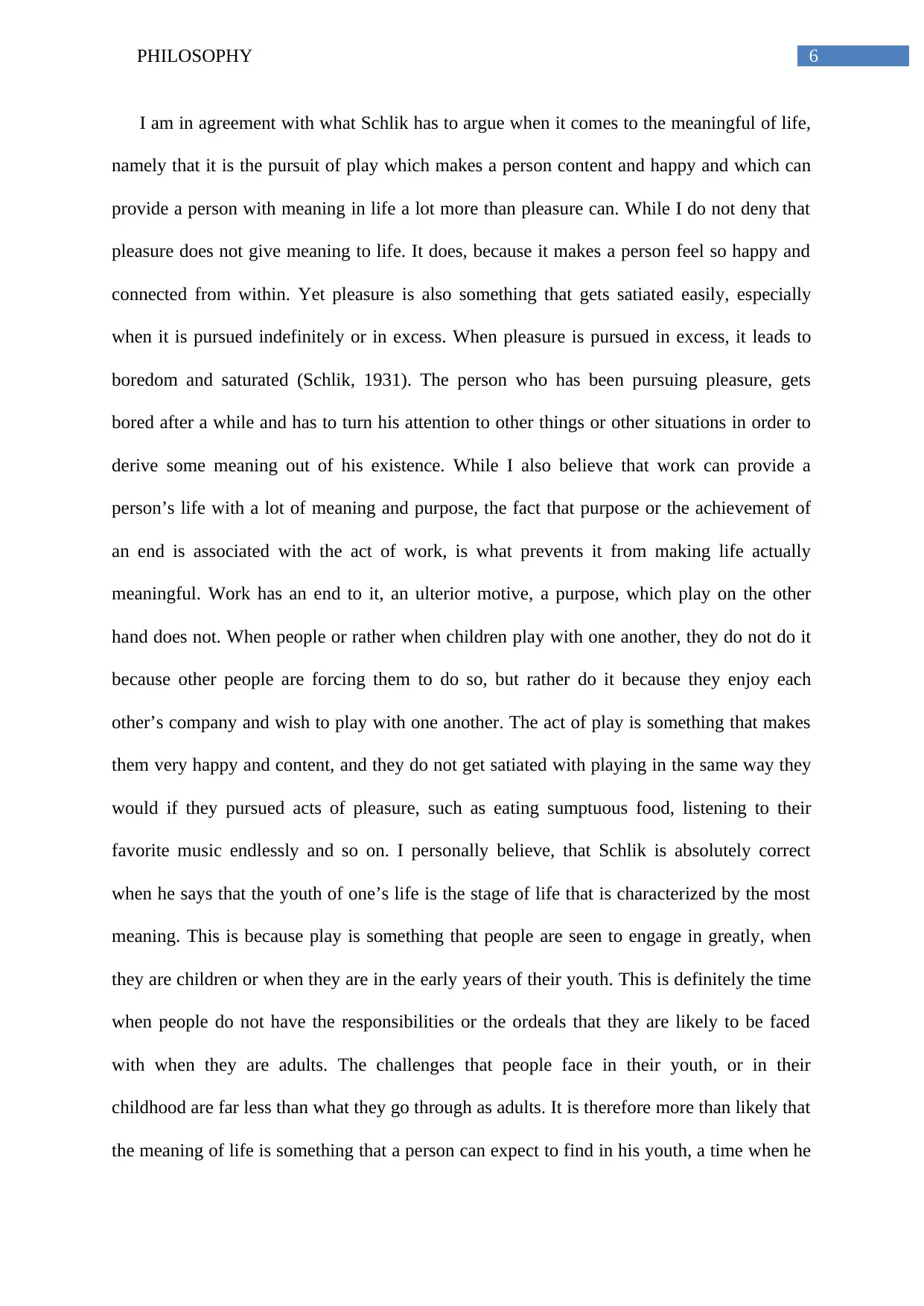
6PHILOSOPHY
I am in agreement with what Schlik has to argue when it comes to the meaningful of life,
namely that it is the pursuit of play which makes a person content and happy and which can
provide a person with meaning in life a lot more than pleasure can. While I do not deny that
pleasure does not give meaning to life. It does, because it makes a person feel so happy and
connected from within. Yet pleasure is also something that gets satiated easily, especially
when it is pursued indefinitely or in excess. When pleasure is pursued in excess, it leads to
boredom and saturated (Schlik, 1931). The person who has been pursuing pleasure, gets
bored after a while and has to turn his attention to other things or other situations in order to
derive some meaning out of his existence. While I also believe that work can provide a
person’s life with a lot of meaning and purpose, the fact that purpose or the achievement of
an end is associated with the act of work, is what prevents it from making life actually
meaningful. Work has an end to it, an ulterior motive, a purpose, which play on the other
hand does not. When people or rather when children play with one another, they do not do it
because other people are forcing them to do so, but rather do it because they enjoy each
other’s company and wish to play with one another. The act of play is something that makes
them very happy and content, and they do not get satiated with playing in the same way they
would if they pursued acts of pleasure, such as eating sumptuous food, listening to their
favorite music endlessly and so on. I personally believe, that Schlik is absolutely correct
when he says that the youth of one’s life is the stage of life that is characterized by the most
meaning. This is because play is something that people are seen to engage in greatly, when
they are children or when they are in the early years of their youth. This is definitely the time
when people do not have the responsibilities or the ordeals that they are likely to be faced
with when they are adults. The challenges that people face in their youth, or in their
childhood are far less than what they go through as adults. It is therefore more than likely that
the meaning of life is something that a person can expect to find in his youth, a time when he
I am in agreement with what Schlik has to argue when it comes to the meaningful of life,
namely that it is the pursuit of play which makes a person content and happy and which can
provide a person with meaning in life a lot more than pleasure can. While I do not deny that
pleasure does not give meaning to life. It does, because it makes a person feel so happy and
connected from within. Yet pleasure is also something that gets satiated easily, especially
when it is pursued indefinitely or in excess. When pleasure is pursued in excess, it leads to
boredom and saturated (Schlik, 1931). The person who has been pursuing pleasure, gets
bored after a while and has to turn his attention to other things or other situations in order to
derive some meaning out of his existence. While I also believe that work can provide a
person’s life with a lot of meaning and purpose, the fact that purpose or the achievement of
an end is associated with the act of work, is what prevents it from making life actually
meaningful. Work has an end to it, an ulterior motive, a purpose, which play on the other
hand does not. When people or rather when children play with one another, they do not do it
because other people are forcing them to do so, but rather do it because they enjoy each
other’s company and wish to play with one another. The act of play is something that makes
them very happy and content, and they do not get satiated with playing in the same way they
would if they pursued acts of pleasure, such as eating sumptuous food, listening to their
favorite music endlessly and so on. I personally believe, that Schlik is absolutely correct
when he says that the youth of one’s life is the stage of life that is characterized by the most
meaning. This is because play is something that people are seen to engage in greatly, when
they are children or when they are in the early years of their youth. This is definitely the time
when people do not have the responsibilities or the ordeals that they are likely to be faced
with when they are adults. The challenges that people face in their youth, or in their
childhood are far less than what they go through as adults. It is therefore more than likely that
the meaning of life is something that a person can expect to find in his youth, a time when he
Paraphrase This Document
Need a fresh take? Get an instant paraphrase of this document with our AI Paraphraser
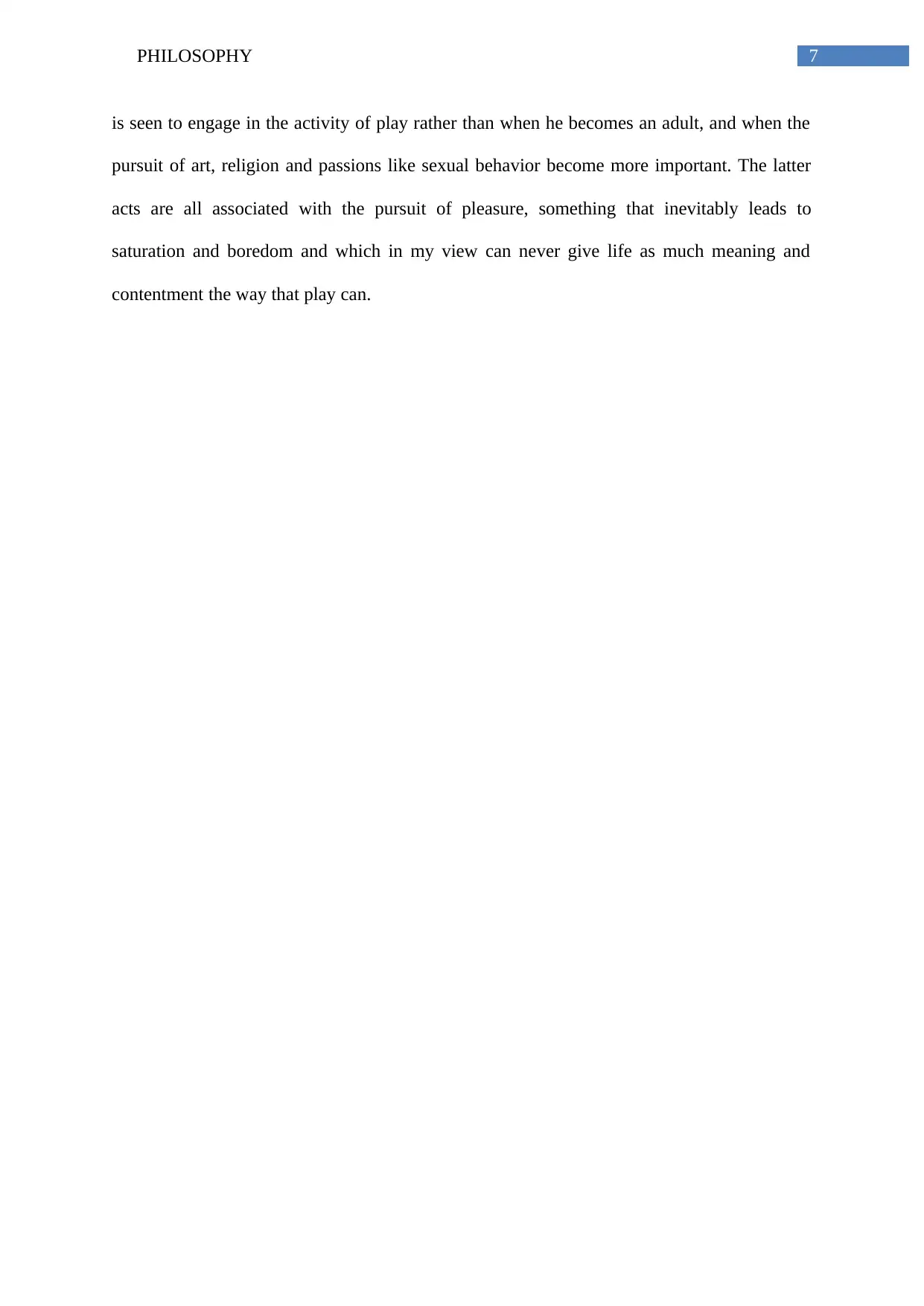
7PHILOSOPHY
is seen to engage in the activity of play rather than when he becomes an adult, and when the
pursuit of art, religion and passions like sexual behavior become more important. The latter
acts are all associated with the pursuit of pleasure, something that inevitably leads to
saturation and boredom and which in my view can never give life as much meaning and
contentment the way that play can.
is seen to engage in the activity of play rather than when he becomes an adult, and when the
pursuit of art, religion and passions like sexual behavior become more important. The latter
acts are all associated with the pursuit of pleasure, something that inevitably leads to
saturation and boredom and which in my view can never give life as much meaning and
contentment the way that play can.
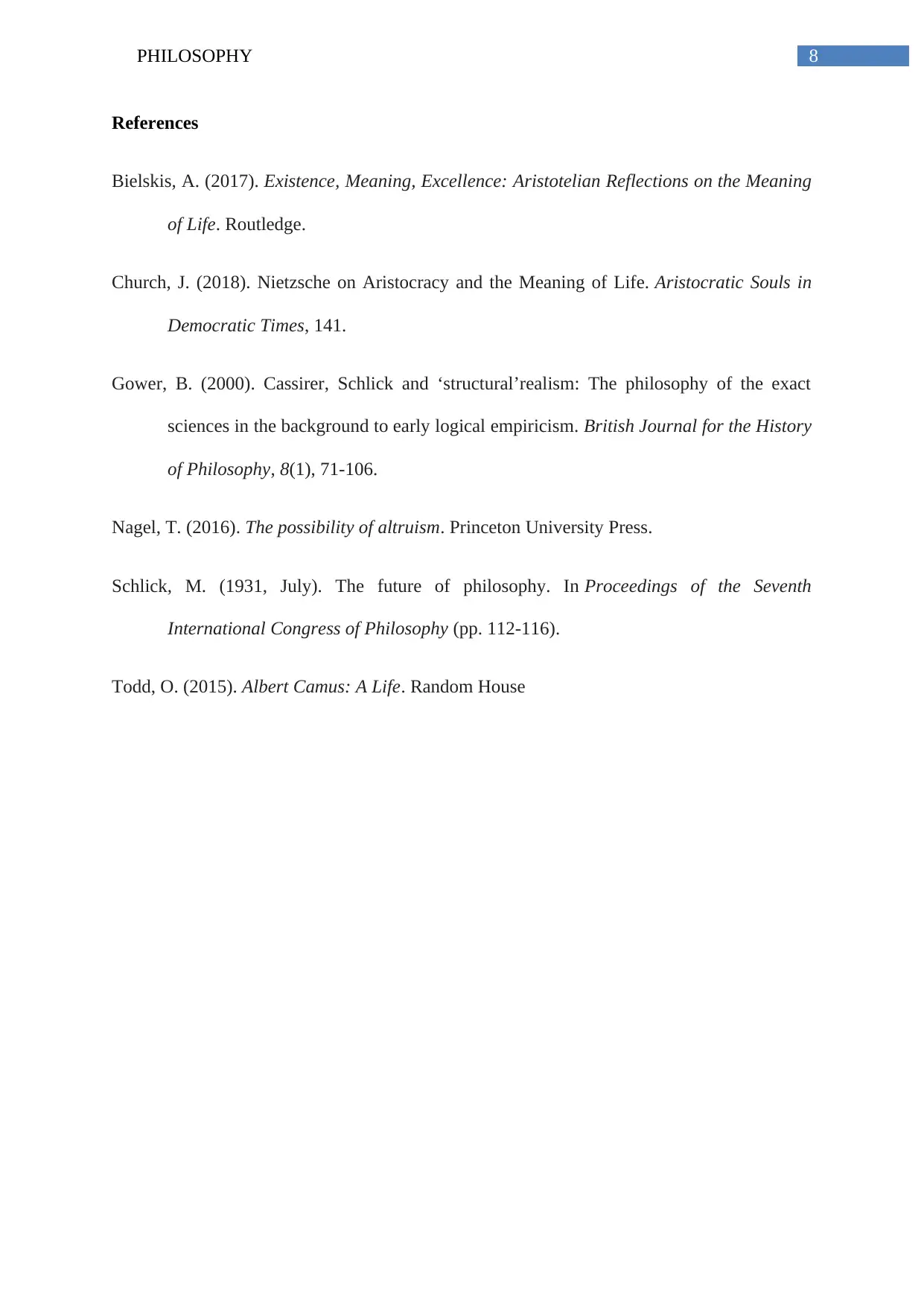
8PHILOSOPHY
References
Bielskis, A. (2017). Existence, Meaning, Excellence: Aristotelian Reflections on the Meaning
of Life. Routledge.
Church, J. (2018). Nietzsche on Aristocracy and the Meaning of Life. Aristocratic Souls in
Democratic Times, 141.
Gower, B. (2000). Cassirer, Schlick and ‘structural’realism: The philosophy of the exact
sciences in the background to early logical empiricism. British Journal for the History
of Philosophy, 8(1), 71-106.
Nagel, T. (2016). The possibility of altruism. Princeton University Press.
Schlick, M. (1931, July). The future of philosophy. In Proceedings of the Seventh
International Congress of Philosophy (pp. 112-116).
Todd, O. (2015). Albert Camus: A Life. Random House
References
Bielskis, A. (2017). Existence, Meaning, Excellence: Aristotelian Reflections on the Meaning
of Life. Routledge.
Church, J. (2018). Nietzsche on Aristocracy and the Meaning of Life. Aristocratic Souls in
Democratic Times, 141.
Gower, B. (2000). Cassirer, Schlick and ‘structural’realism: The philosophy of the exact
sciences in the background to early logical empiricism. British Journal for the History
of Philosophy, 8(1), 71-106.
Nagel, T. (2016). The possibility of altruism. Princeton University Press.
Schlick, M. (1931, July). The future of philosophy. In Proceedings of the Seventh
International Congress of Philosophy (pp. 112-116).
Todd, O. (2015). Albert Camus: A Life. Random House
⊘ This is a preview!⊘
Do you want full access?
Subscribe today to unlock all pages.

Trusted by 1+ million students worldwide
1 out of 9
Your All-in-One AI-Powered Toolkit for Academic Success.
+13062052269
info@desklib.com
Available 24*7 on WhatsApp / Email
![[object Object]](/_next/static/media/star-bottom.7253800d.svg)
Unlock your academic potential
Copyright © 2020–2026 A2Z Services. All Rights Reserved. Developed and managed by ZUCOL.